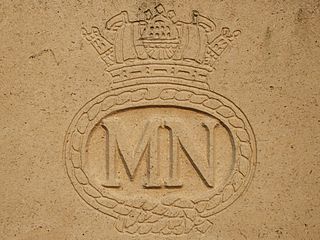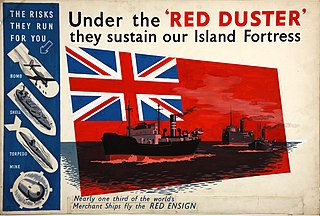
The chief executive of the Hong Kong Special Administrative Region is the representative of the Hong Kong Special Administrative Region and head of the Government of Hong Kong. The position was created to replace the office of governor of Hong Kong, the representative of the monarch of the United Kingdom during British rule. The office, stipulated by the Hong Kong Basic Law, formally came into being on 1 July 1997 with the handover of Hong Kong from the United Kingdom to the People's Republic of China.
Tonnage is a measure of the cargo-carrying capacity of a ship, and is commonly used to assess fees on commercial shipping. The term derives from the taxation paid on tuns or casks of wine. In modern maritime usage, "tonnage" specifically refers to a calculation of the volume or cargo volume of a ship. Although tonnage (volume) should not be confused with displacement, the long ton of 2,240 lb is derived from the fact that a "tun" of wine typically weighed that much.

The Merchant Navy is the maritime register of the United Kingdom and comprises the seagoing commercial interests of UK-registered ships and their crews. Merchant Navy vessels fly the Red Ensign and are regulated by the Maritime and Coastguard Agency (MCA). King George V bestowed the title of "Merchant Navy" on the British merchant shipping fleets following their service in the First World War; a number of other nations have since adopted the title. Previously it had been known as the Mercantile Marine or Merchant Service, although the term "Merchant Navy" was already informally used from the 19th century.

Flag of convenience (FOC) is a business practice whereby a ship's owners register a merchant ship in a ship register of a country other than that of the ship's owners, and the ship flies the civil ensign of that country, called the flag state. The term is often used pejoratively, and although common, the practice is sometimes regarded as contentious.

China Ocean Shipping Company, Limited, formerly China Ocean Shipping (Group) Company, commonly known for its abbreviated name COSCO Group, or simply, COSCO, is one of the major holding companies for COSCO Shipping, one of the world's largest shipping companies. COSCO Shipping was formed in January 2016 by a merger of COSCO and China Shipping Group as one conglomerate.

The Port of Hong Kong located by the South China Sea, is a deepwater seaport dominated by trade in containerised manufactured products, and to a lesser extent raw materials and passengers. A key factor in the economic development of Hong Kong, the natural shelter and deep waters of Victoria Harbour provide ideal conditions for berthing and the handling of all types of vessels. It is one of the busiest ports in the world, in the three categories of shipping movements, cargo handled and passengers carried. This makes Hong Kong a Large-Port Metropolis.

The law of the Hong Kong Special Administrative Region has its foundation in the English common law system, inherited from being a former British colony and dependent territory. There are several sources of law, the primary ones being statutes enacted by the Legislative Council of Hong Kong and case law made by decisions of the courts of Hong Kong.

The Department of Justice (DoJ), is the department responsible for the laws of Hong Kong headed by the Secretary for Justice. Before 1997, the names of the department and the position was the Legal Department (律政署) and Attorney General (律政司) respectively. The Department of Justice's main value is the rule of law. This law is the law that has brought Hong Kong the success of being known as the world's international financial centre. Their leading principle consists of the quote “One country, Two Systems”. The Department of Justice is very important in the legal system in many ways. One being that they give legal advice to other departments in the government system. “drafts government bills, makes prosecution decisions, and promotes the rule of law”. Its main goal is to ensure that Hong Kong's status as the main centre for legal services is enhanced and maintained.

The Hong Kong Special Administrative Region of the People's Republic of China passport is a passport issued only to permanent residents of Hong Kong who also hold Chinese citizenship. In accordance with the Basic Law of the Hong Kong Special Administrative Region, since the transfer of sovereignty on 1 July 1997, the passport has been issued by the Immigration Department of the Government of Hong Kong under the authorisation of the Central People's Government of the People's Republic of China. As the official languages of Hong Kong are Chinese and English, the passport is printed bilingually in both Chinese and English.

The Hong Kong identity card is an official identity document issued by the Immigration Department of Hong Kong. According to the Registration of Persons Ordinance, all residents of age 11 or above who are living in Hong Kong for longer than 180 days must, within 30 days of either reaching the age of 11 or arriving in Hong Kong, register for an HKID. HKIDs contain amongst others the name of the bearer in English, and if applicable in Chinese. The HKID does not expire for the duration of residency in Hong Kong.

Gross tonnage is a nonlinear measure of a ship's overall internal volume. Gross tonnage is different from gross register tonnage. Neither gross tonnage nor gross register tonnage should be confused with measures of mass or weight such as deadweight tonnage or displacement.
The flag state of a merchant vessel is the jurisdiction under whose laws the vessel is registered or licensed, and is deemed the nationality of the vessel. A merchant vessel must be registered and can only be registered in one jurisdiction, but may change the jurisdiction in which it is registered. The flag state has the authority and responsibility to enforce regulations over vessels registered under its flag, including those relating to inspection, certification, and issuance of safety and pollution prevention documents. As a ship operates under the laws of its flag state, these laws are applicable if the ship is involved in an admiralty case.
Under Article 108 of the Basic Law of Hong Kong, the taxation system in Hong Kong is independent of, and different from, the taxation system in mainland China. In addition, under Article 106 of the Hong Kong Basic Law, Hong Kong has independent public finance, and no tax revenue is handed over to the Central Government in China. The taxation system in Hong Kong is generally considered to be one of the simplest, most transparent and straightforward systems in the world. Taxes are collected through the Inland Revenue Department (IRD).

A merchant navy or merchant marine is the fleet of merchant vessels that are registered in a specific country. On merchant vessels, seafarers of various ranks and sometimes members of maritime trade unions are required by the International Convention on Standards of Training, Certification and Watchkeeping for Seafarers (STCW) to carry Merchant Mariner's Documents.

In 1961 China established a state-run maritime shipping company and subsequently signed shipping agreements with many countries, laying the foundation for developing the country's ocean transport. That organization developed into the present-day China Ocean Shipping (Group) Company (COSCO). The Chinese government also invested heavily in water transport infrastructure, constructing new ports and rebuilding and enlarging older facilities.

Net tonnage is a dimensionless index calculated from the total moulded volume of the ship's cargo spaces by using a mathematical formula. Defined in The International Convention on Tonnage Measurement of Ships that was adopted by the International Maritime Organization in 1969, the net tonnage replaced the earlier net register tonnage (NRT) which denoted the volume of the ship's revenue-earning spaces in "register tons", units of volume equal to 100 cubic feet (2.83 m3). Net tonnage is used to calculate the port duties and should not be taken as less than 30 per cent of the ship's gross tonnage.

The visa policy of Hong Kong deals with the requirements in which a foreign national wishing to enter Hong Kong through one of the 15 immigration control points must meet to obtain an entry permit or Visa, which depending on the traveller's nationality, may be required to travel to, enter, and remain in the Hong Kong Special Administrative Region. Visitors from over 145 countries are permitted without Visa entry for periods ranging from 7 to 180 days, to the Hong Kong Special Administrative Region for tourism or certain business-related activities. All visitors must hold a passport valid for more than 1 month.
The port of Hong Kong is a deep water port located in southern China. It is one of the hub ports serving the South-East and East Asia region, and is a gateway to mainland China. The city of Hong Kong began as a colony of the United Kingdom. It was a free port, and became an international trade center connecting land and sea transport between China and other countries. The port has mature infrastructure and well-developed air-sea-land transport. It helps Hong Kong maintain its position on international trade centre and transshipment hub.

The Constitutional and Mainland Affairs Bureau is a ministerial-level policy bureaux of the Government of Hong Kong responsible for the implementation of the Basic Law, including electoral matters and promotion of equal opportunities and privacy protection. The bureau also functions as the intermediary between the HKSAR Government and the Central People's Government and other Mainland authorities under the principles of "One Country, Two Systems", including the coordination of liaison between the HKSAR Government and Central authorities, promoting regional co-operation initiatives between Hong Kong and the Mainland, and overseeing the operation of offices of the HKSAR Government on the Mainland.














